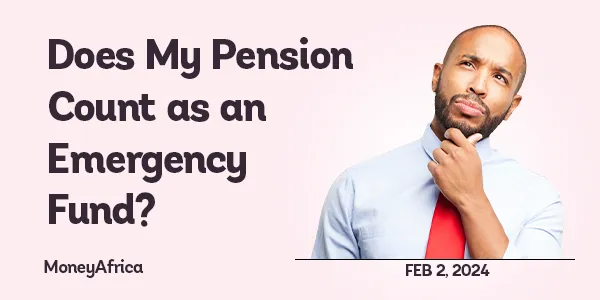Friday letters are usually dedicated to taking questions from our community. Do you have a question for us? Please feel free to
- send an e-mail to info@themoneyafrica.com; or
- send a DM to any of our social media channels, or
- simply fill out this form. Don’t worry, your responses are kept anonymous.
***
Question
For those working outside Nigeria, does their pension count as emergency funds or would they need to create a personal emergency fund?
Answer
An emergency fund is any money you set aside for unexpected expenses or emergencies. It is treated as a savings that can be easily withdrawn at any time. This fund is meant to meet any unforeseen expenses that may arise, whether in the present or future years. Pensions, however are regular payments from your retirement plan. It is paid to you after retirement regularly to sustain you when the usual salary or income stops.
View your pension as a safety net, and the personal emergency fund as a crucial step to avoid meddling with your savings and investments. It is important you create a separate fund for immediate access during unforeseen circumstances.
Pension provides a level of financial security but should not be your ideal go-to for immediate emergencies.
Here are steps to create a personal emergency fund:
Step 1: Assess your monthly living expenses.
Step 2: Aim to save at least 3 to 6 months’ worth of the calculated expenses.
Step 3: Prioritise liquidity for quick access in unforeseen situations.
***
Question
Can you give recommendations on health insurance?
Answer
Health insurance is a plan that covers medical expenses. It financially protects you against healthcare costs. Before choosing a health insurance plan, you need to evaluate your health needs and risks, and then research extensively considering factors like coverage scope, premiums, and network hospitals. Tailor the plan to your specific needs and any potential future scenarios based on what you found.
There are many health insurance companies you can choose from. You can use this link below to make a choice.
***
Question
What is the difference between stocks, shares, mutual funds and dollar mutual funds? How can I know the right investment and how can I go about it? Is the principal guaranteed?
Answer
Stocks and shares are simply ways of investing and becoming a part owner in a company. A share is a unit of ownership in a company and is issued out to raise capital for the company. You can see stocks as buying shares of ownership in a public company. A mutual fund pools money from multiple investors to invest in a diversified portfolio of stocks, bonds, or other securities. Dollar mutual funds are simply mutual funds that are invested in US dollar-denominated instruments. Mutual funds give you exposure to a wide range of underlying assets while offering you the opportunity to spread out their investment risk.
To know the right investment for you, gain clarity on your financial goals, and how much risk you can tolerate. Studying the investment fact sheet before investing should help you understand the fund better—its objective, performance, risk profile and costs.
Note that the principal is not guaranteed in these investments. This means that the value of these types of investments can fluctuate based on market conditions. If the stock price goes down, the value of your investment decreases, and you may not get back the full amount you initially invested.
***
Would you like to know the state of your finances?
Take this test to see how you are doing financially
***
Do you know that we have our own podcast? It’s MONEYTALKS!💚
Here’s a link to listen to all the amazing episodes we have!
***
Thank you for reading Money Africa’s Blog.
Please feel free to share it.
Do you have any questions? You can send an e-mail to info@themoneyafrica.com or send a DM to any of our social media channels.
***
MoneyAfrica premium plan
Are you a mid to high-income earner? Do you find communities a bit too busy? You should sign up for our premium plan.

You can learn more about that here.
***
We often get questions regarding how to plan your finances to align with your relocation plans, especially for students seeking to further their studies. As always, we have heard you, and we have put together an e-book to help you navigate this. Follow this link, to get your FREE copy of the e-book: The Japa Encyclopedia.
***
Get our annual subscription and learn more about investing safely and building a solid portfolio in 2024.
Don’t forget to:
- Join our community, if you want to smash your 2024 financial goals. It takes at least 30 days to build great habits that will last you a lifetime. So why not start now? There is a lot you can achieve.
- If you would like to document your financial journey in 2024, then our journal would be an excellent fit for you. It costs ₦7,500 (excluding delivery).
- Get a budget sheet to track your monthly expenses. Click here
- Get an investment tracker to be on top of all your investments. Click here
MoneyAfrica is a financial literacy platform. Our goal is to make everyone better with their finances.
We do this by engagements via our:
– social media handles
– platforms for paid community members (for adults and students)
– webinar sessions with corporate clients
Would you like to join any of the communities? Please click here
Would you like us to hold a webinar for your company’s staff? Please send an email to info@themoneyafrica.com


